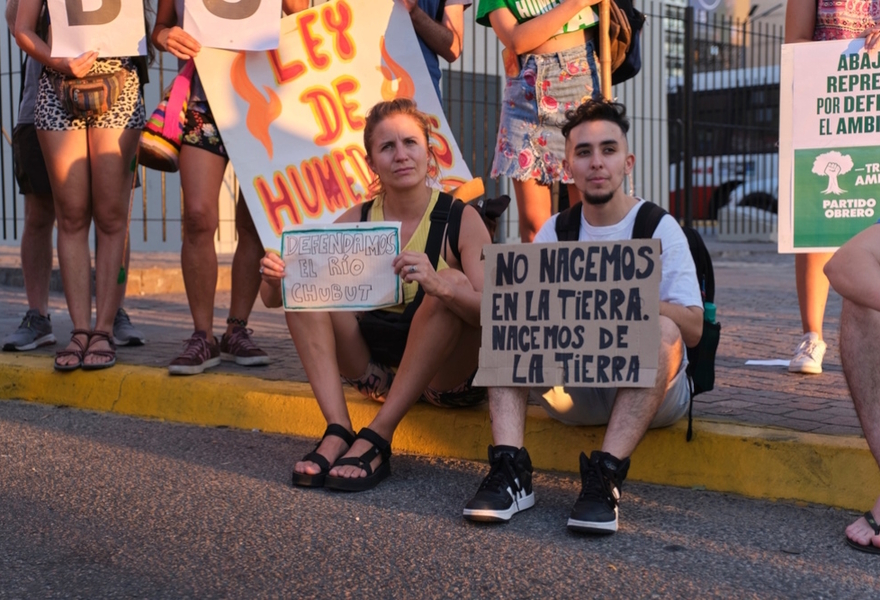How Latin America can achieve a socially balanced climate transition
Raise the price of fossil fuels, and distribute the revenues back to the population in a targeted manner: a new study provides empirically based guidance for 16 countries.

"We are not born on the Earth, but of the Earth": climate demo in Argentina's capital Buenos Aires (March 2023). | Photo: Shutterstock/Jaramillo
As of today, much of Latin America has announced that it will reduce greenhouse gas emissions to net zero by 2050. But how can this be achieved, politically, in a region that has such a large gap between rich and poor? A study now shows the potential consequences of carbon pricing as a core instrument of climate policy for 16 countries, encompassing 544 million people, and how social disruptions could be avoided through targeted redistribution of the resulting government revenues. The study was led by the Berlin-based climate research institute MCC (Mercator Research Institute on Global Commons and Climate Change), and published in the renowned journal World Development.
For the analysis, which is unprecedented in this form, the researchers use national household expenditure surveys in Argentina, Barbados, Bolivia, Brazil, Chile, Colombia, Costa Rica, the Dominican Republic, Ecuador, El Salvador, Guatemala, Mexico, Nicaragua, Paraguay, Peru, and Uruguay. It combines the household budgets with the carbon intensities of the various expenditure items derived from the GTAP database, thus determining the “footprint” of each household and its respective burden arising from a potential increase in the price of fossil fuels. Indirect consequences are considered through higher prices for climate-damaging consumer products. To explore the complex distributional impacts, individual cost burdens are matched with socio-economic characteristics through statistical analyses. Drivers indicating high vulnerability are, for example, car ownership or cooking with liquid gas burners, while characteristics indicating low vulnerability are urban living or higher education.
“As a result, we provide a map of the foreseeable distributional impacts of climate policies in Latin America,” reports Leonard Missbach, PhD student in the MCC working group Climate and Development, and lead author of the study. “In eleven countries, carbon pricing has an overall regressive effect, i.e. in percentage terms it burdens the poor more than the rich, while in five countries it has a progressive effect. In all these countries, the differences within the respective income groups are greater than those between rich and poor in general. To minimise the risk of carbon pricing failing due to turmoil, as arose in the fuel price riots in Ecuador in 2019, it is important to understand who would be affected, also to think of potentially targeted revenue recycling schemes.”
The household budgets are also used to determine the extent to which the population has access to transfer channels for direct state payments, i.e. the extent to which the redistribution of carbon price revenues would at present be technically feasible. According to the study, in Paraguay, for example, only 6 percent of the potentially most vulnerable households are connected to existing systems of direct government payments. Across all countries, there are 18 million households with a particular hardship: they are each among the poorest fifth in their country, and among the fifth with potentially the greatest relative exposure to carbon pricing. In addition, they don’t have access to transfer channels.
“In Latin America, it is particularly important to embed carbon pricing in a comprehensive policy mix,” summarises Jan Steckel, working group leader at MCC and a co-author. “The revenues resulting from pricing could be used in a way that addresses the respective drivers of high climate change mitigation costs in households. In addition to direct payments, depending on the country-specific circumstances, investments in bus and rail, promotion of e-mobility or temporary exemption of LPG cookers from carbon pricing, for example, can help. Certain tax cuts or programmes for education or health can also improve the social balance of climate policies. Our paper offers guidance for policymakers to design appropriate compensation measures."
Reference of the cited article:
Missbach, L., Steckel, J., Vogt-Schilb, A., 2023, Cash transfers in the context of carbon pricing reforms in Latin America and the Caribbean, World Development
https://authors.elsevier.com/a/1hv6W,6yxDOfA3





